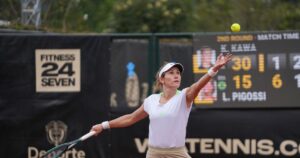
RIYADH, Saudi Arabia — After 55 Hologic WTA Tour tournaments across a sprawling 25 countries — with 35 different champions — we’re down to a single match.
It’s 20-year-old Coco Gauff versus 22-year-old Zheng Qinwen in Saturday’s conclusion of the WTA Finals Riyadh presented by PIF.
WTA Finals Riyadh: Scores | Schedule | Standings
WTA Finals championship, Saturday 7 p.m. in Riyadh (11 a.m. ET)
If you were expecting to see No.1 Aryna Sabalenka and No.2 Iga Swiatek in the finale, you haven’t been paying strict attention this unpredictable season. Sabalenka fell in the semifinals to Gauff in straight sets and Swiatek never even made it that far.
Instead, we have the No.3-seeded Gauff opposite No.7 Zheng — a fun, frothy matchup we could be seeing for another decade. Certainly, there’s a precedent here, for Gauff and Zheng are the youngest pair (42 years, 259 days) to reach the final at the year-end tournament since (wait for it) … 2004, when Serena Williams was 23 and Maria Sharapova only 17 (40 years, 251 days).
“I asked that as soon as I got the match” Gauff said, “I asked `Was this the youngest? It has to be some kind of record.’ I asked the Sky team, what was the answer. They didn’t have it, but that’s good to know.
“It was 2004. The year I was born was the last time, so in my lifetime, basically, I’ve never seen it. That’s pretty cool. It just shows age is a number both ways, old and young.”
Friendly warning: Brace yourself for a raft of those cheesy youth-is-served headlines.
Gauff is the youngest finalist since Caroline Wozniacki in 2010 and can become the youngest winner since Sharapova won it two decades ago. There’s another parallel, too. Gauff is the youngest player to beat No.1 at the WTA Finals since Sharapova dispatched Lindsay Davenport.
Zheng lost her only previous match to Gauff earlier this year in Rome, falling in the quarterfinals 7-6 (4), 6-1. But based on what she’s shown in the back half of the season — no one has won more matches than Zheng since Wimlbedon (31) — who really knows how it’s going to go?
Well, modestly, we do.
Victoria Chiesa and Greg Garber debate the relative merits of these two precocious finalists:
Advantage, Zheng
After a strong performance defeating Wimbledon champion Barbora Krejcikova 6-3, 7-5 in Friday’s semifinal, Zheng told emcee Andrew Krasny that what made her proudest wasn’t her nine aces or 22 winners, but her mental strength.
And for good reason. Zheng was coasting against the Wimbledon champion 6-3, 3-0 but admitted she “dropped focus.” Krejcikova would go on to win four straight games. It was the beginning of a spiral that could leave a player frozen.
But not Zheng — not this Zheng.
“In that moment, I’m not panicked,” the Olympic gold medalist told Krasny.
When you’ve won as much as Zheng has this year, it’s easy to see why there is little cause for concern. Aside from her historic podium-topping Paris performance, Zheng captured two other titles and comes into the last match of the season with 52 wins across all levels this year.
Upon arriving in Riyadh, Zheng said this season has taught her not only about reaching the top — but what it takes to remain there.
On Saturday, Zheng will face a star whom she’s never beaten before in Gauff. Rome’s effort was the kind of match that a lesser version of Zheng, one still adjusting to the rarified air at the top, unraveled in quickly after she failed to squeak out a tight first set.
Zheng likely won’t make the same mistake again. If she shows the composure that’s characterized her Riyadh run, coupled with the same level that’s seen her edge two Wimbledon winners and rout Jasmine Paolini this week, she can walk away the WTA Finals champion. — Victoria Church
Advantage, Gauff
Facing the newly minted No.1 year-end player in the world, nearly six years her junior, Gauff was unafraid.
Both players were credited with 14 winners, but Gauff had 20 fewer than Sabalenka’s 47. That’s the kind of pressure Gauff’s defense exerts — even against Sabalena’s savage groundstrokes. When she’s serving well and consistently from the baseline, she’s tough to beat.
And in the crucible of break points, Gauff was better, converting six of 11, compared to four of 13 for Sabalenka.
This is the Gauff that so many — fairly or unfairly — have been waiting to emerge. In some ways, she’s a victim of her early success; that’s what happens when you reach Wimbledon’s fourth round at the age of 15. After she won her first Grand Slam singles title last year, still a teenager, some people wondered why it didn’t happen again this year.
It’s instructive that since failing to defend her US Open title, losing in the Round of 16 to Emma Navarro, she’s now won 12 of her past 14 matches. She’s won 52 matches this year, a career best.
In the opening round, Sabalenka took care of Zheng in straight sets. On Friday night, Gauff did the same to Sabalenka. What will transpire on Saturday night, Victoria? Even I can do that math. — Greg Garber
Source: https://www.wtatennis.com/news/4165499/gauff-or-zheng-who-s-got-the-edge-in-the-wta-finals-championship-match-


